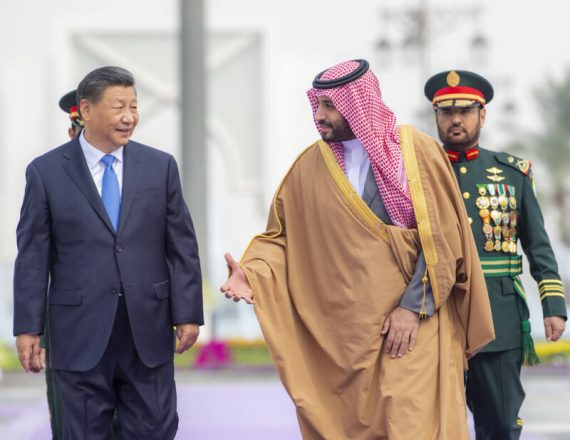C
hina’s traditional reluctance to get involved in international crises and conflicts, particularly beyond its regional sphere of influence, has now become obsolete as the rising power increasingly seeks to become a global player rivaling the United States. Conflict management and crisis diplomacy are now integral to China’s diplomatic involvement in the Middle East. China and its Middle Eastern partners are building a strategic multipolarity that would serve their national interests better than the current U.S.-led order giving rise to a new strategic multipolar order.
The Middle Eastern middle powers view China’s growing involvement in the region as steps towards a multipolar order, which would help them counterbalance the U.S. influence. In March 2021, Iran and China signed a 25-year strategic cooperation agreement entailing economic, military, and cybersecurity cooperation. Both states seek to undermine U.S. dominance in the Middle East: Iran needs China for tackling U.S.-led sanctions aimed at crippling its economy, while China imports cheap oil and gas from Iran.
A similar mutually beneficial relationship also exists between Saudi Arabia and China. The two countries are building a strategic partnership through a series of trade and investment deals. Chinese companies are set to build factories in Saudi Arabia and the kingdom is already China’s biggest supplier of crude oil. In June 2023, Saudi Minister of Investment Khalid Al-Falih told CNBC that he believes a multipolar world has emerged and that cooperation between the Gulf Cooperation Council (GCC), the Arab world, and China will be a significant part of the new order.
Is China replacing the U.S.?
The U.S. has been a key player in the Middle East since the end of World War II, while the regional order was mostly dominated by the U.S. and its allies. The U.S. brokered peace between Egypt and Israel; has formed alliances with Israel, Saudi Arabia, Turkey, and Egypt and since the mid-1970s with Egypt; and used to be allies with Iran until the Islamic Revolution in 1979.
By the end of the Cold War, the U.S. appeared even more forceful (or hegemonic); however, more recently, it has lessened its involvement in the region as it seeks to shift its focus to Asia-Pacific. China, on the other hand, aims to militarily counter the U.S. in the Asia-Pacific region and has increased its diplomatic and economic engagement with the Middle East.
China has achieved some notable success in peacemaking in the Middle East. Chinese officials have successfully mediated between Saudi Arabia and Iran for normalization of the relations between the two states. China’s trade relations with both have been substantially progressing and it has also offered to mediate in the Israel-Palestine conflict, which used to be an exclusive domain of American diplomacy. In fact, China has established strategic partnerships across the Middle East, including Egypt, Saudi Arabia, Iran, the United Arab Emirates, Turkey, Jordan, Qatar, Iraq, Oman, Kuwait, Israel, and Palestine.
No other country, not even the U.S., has such a long list of partners in the region. Although the level of engagement with China substantially varies from one country to another, the length of the list is indicative of China’s ambitions. Given such developments, many Middle East analysts pose the same question: Is China going to replace the U.S. as the main external actor in the region?
Recommended
Analysts agree that China is yet to establish itself as a global military power while the U.S. still enjoys certain advantages such as its long-established alliances and military bases across the Middle East. Some point out that China and the U.S. share the same crucial regional interests: access to energy resources and freedom of navigation. As the Chinese and American interests are compatible, the emerging multipolar order in the region is not necessarily detrimental for U.S. interests.
Would multipolarity prove stable in the Middle East?
A multipolar order, according to some IR scholars, would prove stable among competitors who have equal distribution of power. In the case of the emerging multipolarity in the Middle East, power appears dispersed but not equally distributed. The region’s key actors, Egypt, Iran, Turkey, and Saudi Arabia, have varying levels of economic and military capacities. Shifts in power balance may also complicate the regional order. For instance, Iran becoming a nuclear power would not be welcomed by the other regional actors, and would likely result in an unstable multipolarity.
The emerging multipolarity may not prove stable in the middle or long term, but it currently serves the interests of the Middle Eastern middle powers and China well. It also poses no threat to the vital U.S. interests. The Middle East actors cannot aspire to regional dominance given their current capabilities, but through their partnerships with China they can create a strategic multipolarity which serves their national interests. If in the future the actors perceive their interests differently based on the acquisition of more capabilities, the multipolarity might be undermined.
The Chinese-brokered Saudi-Iran diplomatic normalization deal is a case in point. The deal has a limited scope because neither Saudi Arabia nor Iran desires full-fledged collaboration in regional affairs. The Iranians and Saudis instead seek stronger ties with China which would help them strengthen their standing vis-à-vis the U.S. In other words, the Chinese quest for multipolarity in the Middle East corresponds to the strategic multipolarity sought by Middle Eastern middle powers.





